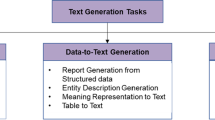Abstract
In order to satisfy the informational demands of different users, generated texts should be tailored to the respective user types. Document planning may benefit from a formal modeling of the participating agents (the generation system and the user) within the framework of game theory. We show how rhetorical structures map to speaker strategies, and how a user model may be represented as a domain theory, containing different hypotheses for the listener strategies. Based on this, we present an algorithm which simultaneously performs the tasks of message selection and document structuring.
Access this chapter
Tax calculation will be finalised at checkout
Purchases are for personal use only
Preview
Unable to display preview. Download preview PDF.
Similar content being viewed by others
References
Console, L., Dupre, D., Torasso, P.: On the relationship between abduction and deduction. Journal of Logic and Computation 1(5), 661–690 (1991)
Jäger, G.: Evolutionary game theory and typology: a case study. Language 83, 74–109 (2007)
Klabunde, R.: Towards a game-theoretic approach to document planning. In: Proceedings of ENLG 2009, pp. 102–105 (2009)
Klabunde, R., Kornrumpf, A.: A game-theoretic approach to document planning for performance data (forthcoming)
Lewis, D.: Convention. Harvard University Press, Cambridge (1969)
Mann, W.C., Thompson, S.A.: Rhetorical structure theory: Toward a functional theory of text organisation. Text 8(3), 243–281 (1988)
Pietarinen, A.-V. (ed.): Game Theory and Linguistic Meaning. Elsevier, Amsterdam (2007)
Reiter, E., Dale, R.: Building Natural Language Generation Systems. Cambridge University Press, Cambridge (2000)
Shoham, Y., Leyton-Brown, K.: Multiagent Systems. Algorithmic, Game-Theoretic, and Logical Foundations. Cambridge University Press, Cambridge (2009)
Sripada, S.G., Reiter, E., Hunter, J., Yu, J.: Generating English Summaries of Time Series Data Using the Gricean Maxims. In: Proceedings of the 9th ACM SIGKDD International Conference on Knowledge Discovery and Data Mining, pp. 198–196 (2003)
Author information
Authors and Affiliations
Editor information
Editors and Affiliations
Rights and permissions
Copyright information
© 2010 Springer-Verlag Berlin Heidelberg
About this paper
Cite this paper
Klabunde, R., Kornrumpf, A. (2010). User-Tailored Document Planning – A Game-Theoretic Approach. In: Loftsson, H., Rögnvaldsson, E., Helgadóttir, S. (eds) Advances in Natural Language Processing. NLP 2010. Lecture Notes in Computer Science(), vol 6233. Springer, Berlin, Heidelberg. https://doi.org/10.1007/978-3-642-14770-8_24
Download citation
DOI: https://doi.org/10.1007/978-3-642-14770-8_24
Publisher Name: Springer, Berlin, Heidelberg
Print ISBN: 978-3-642-14769-2
Online ISBN: 978-3-642-14770-8
eBook Packages: Computer ScienceComputer Science (R0)




